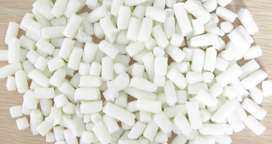Mountain Sky Makes Handmade Castile Soap.
There are two main processes for making hard bar opaque soap, the hot process and the cold process.
 Commercial soap (Irish Spring, Dove, Body Shop soap, Dr. Bronner’s hard bar soap, Kirk’s) is manufactured by using a hot process method. In the hot process, oils and alkali are boiled together for a period of time to create saponification (the process where the oils and the alkali bind).
Commercial soap (Irish Spring, Dove, Body Shop soap, Dr. Bronner’s hard bar soap, Kirk’s) is manufactured by using a hot process method. In the hot process, oils and alkali are boiled together for a period of time to create saponification (the process where the oils and the alkali bind).
During the boiling, the soap product and glycerin separate. In many large commercial processes, the glycerin is separated out and sold, and the soap mixture is then either extruded into molds or made into generic soap noodles for later soap molding processes.
Separating the glycerin out from hot process soap mixtures prevents the soap from shrinking on the shelf which is an advantage for large commercial soap manufacturers. In addition, a hot process soap mixture can be extruded into molds for a uniform shape.
The majority of soap noodle production is for export and is primarily based in Malaysia, China, India and Australia; however, there are other soap  noodle facilities where palm and coconut plantations exist.
noodle facilities where palm and coconut plantations exist.
Since the hot process soap mixture for soap noodles or for mold extrusion is boiled for such a long time, the oils in hot process soap can go rancid. So to counter rancidity, many preservatives are added to keep hot process soaps stable for a longer shelf life.
Soap made from soap noodles or hot process extrusion factories have a characteristic rounded edge molded appearance. However, a lot of home crafters also use soap noodles to create unique soaps.
 Soaps made with soap noodles do not have to disclose or list all the preservative ingredients (BHT, EDTA ,Propylene Glycol (and) Diazolidinyl Urea (and) Methylparaben (and) Propylparaben) contained in the soap noodles. Soap manufacturers that use soap noodles only have to disclose the ingredients that they add to create their soap bar, they do not have to fully disclose the ingredients in the soap noodle. Final ingredient listings can be very deceiving as not all ingredients have to be listed.
Soaps made with soap noodles do not have to disclose or list all the preservative ingredients (BHT, EDTA ,Propylene Glycol (and) Diazolidinyl Urea (and) Methylparaben (and) Propylparaben) contained in the soap noodles. Soap manufacturers that use soap noodles only have to disclose the ingredients that they add to create their soap bar, they do not have to fully disclose the ingredients in the soap noodle. Final ingredient listings can be very deceiving as not all ingredients have to be listed.
Most handcrafted soap manufacturers tend to use the cold process method of production where oils are heated just to the melting temperature and mixed with an alkali to create saponification. The cold process soap mixture is then poured into large blocks, cut and cooled off, and then cured for approx. 4-5 weeks.
Cold process castile soaps retain glycerin and do not need chemical preservatives because the oils have not boiled. Hand-cut castile soaps like Mountain Sky soaps do not have a uniform everything looks exactly the same appearance. There is a certain beauty to the individual differences in each hand cut soap.
However, as soap noodles have become more prevalent, many small scale soap makers have also started to use soap noodles such as with melt and pour soap making kits. Sometimes these soaps look just like hand cut castile soaps as they are often poured into blocks and hand cut.
Cold process soaps retain the glycerin content, use less manufacturing processes and contain less preservatives in the soap, all better for the planet.
We at Mountain Sky make all of our products from carefully sourced raw materials right in our own facility. We know exactly what we put  into our high quality soaps that we create for our customers.
into our high quality soaps that we create for our customers.
Mountain Sky has been producing handmade castile soaps since 1993 and is a family friendly manufacturer.
Wondering if you can wash your hair with soap? Click HERE



